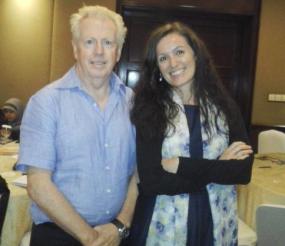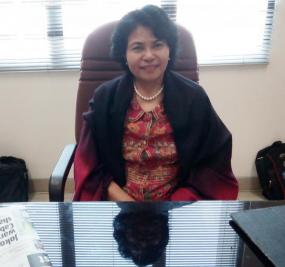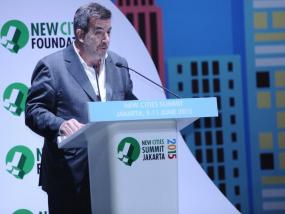Strategic Review Forum: “Pluralism and Progress: Indonesia’s Hope,” Jan 16, 2013, Four Seasons Hotel, Jakarta.
“If a country is not able to protect its citizens, then the country fails:” Exclusive interview with Nusron Wahid
Nusron Wahid is a Golkar Party politician and the chairman of Ansor, the youth wing of Nahdlatul Ulama
Strategic Review: Do you perceive increased intolerance over religious diversity in Indonesia?
Nusron Wahid: Compared to when? The New Order era? It's difficult to compare because the situation now is different. It is seemingly more apparent today because the media is more transparent. It was not so obvious in the New Order era because the media was not transparent.
There has been an increase in the mass media and alternative media during a Reformasi era that does not have sufficient law of order, which is why intolerance is seemingly escalating. But if the focus is to compare with the past, there is no strong data on that. During Reformasi, research and statistics show an increase in cases of religious intolerance. That has to do with establishing a model of democracy in Indonesia.
Democracy contains various instruments, one of which is freedom of speech and expression. But democracy is not merely freedom, there are other prerequisites, namely the presence of social order. Social regulation requires common sense, awareness together with social norms. There are boundaries of what should and should not be discussed. Social order can only be formed if there is social justice. This is a process of change.
It is the same thing with religious intolerance. Religion is a fundamental right for humanity. We cannot discuss the reasons for a belief or a religion. It could be because of parents or the environment. I was educated in Islamic norms, which is why I became a Muslim. So it is not necessarily a choice. But it is the right of each individual. When the rights of an individual are taken away, it becomes a problem.
SR: Why is it so difficult for the government and legal system to overcome intolerance?
Nusron: One of the most powerful factors in the Reformasi era is the boom in civil participation. This uprising of activity is not matched by a sufficient state apparatus. There was not enough training for the authorities to face such situations. But the problem is, why keep this up? We need strong leadership from law enforcement and government. What is their task? To protect the basic rights of citizens, to support the Constitution.
SR: Do you think it has anything to do with the upcoming 2014 election?
Nusron: That's an assumption. It cannot be proven. But apart from that, this country has not succeeded in ensuring the core tasks of the government apparatus. The task is essentially to protect the fundamental rights of citizens -- the right to live, to worship. The State should protect someone’s rights even if they are not part of the majority because that is the State’s duty. There is no other task. If a country is not able to protect its citizens, then the country fails.
There is now a majority group that neglects the rights of the minority. The state must take sides, not with the majority but with the Constitution. The state often takes the majority side in the name of preserving social order. What if everyone in this country is a criminal, do good people need to be killed for the sake of the majority?
SR: Other than siding with the majority, do you think there is bias toward their own religion?
Nusron: No, lah. Fear. Fear of unpopularity. Because they feel that if they defend the minority, they won’t garner public sympathy, the majority won’t vote for them. The problem in our democracy is that it is choppy and does not follow a rational model.
SR: Indonesia has the largest Muslim population in the world, do you think this leads to bullying against minorities?
Nusron: That’s too rough a sentence. Yes, this is a predominantly Muslim country, but supposedly the stronger the faith is, the more fearless people are, except in the face of God. It is that way in other religions as well. The stronger the faith, the less they should be afraid of minorities.
“Thuggery” is too rough; it is more appropriate to call it anxiety, but, what's to worry about? If we are strong in our faith, pious and devout in our worship, whatever happens will not affect us, will not cause anxiety. Even though there are a thousand church bells, why worry? It is as if they do not realize that people have different habits. But when there is difference, they think it strange. Everyone has their own variations, as long as it does not interfere with the view of others. Do not make norms based on one‘s own virtues
SR: What do you think about religious groups oppressing minority sects?
Nusron: In any social group, there must be a leader, followers and discipline. We do not have to blame, say, the FPI for praying. There is no problem with that. The problem is when they take on the role of the police or the State.
SR: But the State allows such things to happen…
Nusron: The State should not allow it.
SR: What are your activities in GP Ansor [the youth wing of NU] and how do they tackle religious intolerance?
Nusron: To lower intolerance, there must be preventive action, especially within the Muslim community, and public education to raise the understanding that diversity is acceptable. That knowledge must be socialized, although it is still a struggle to uphold that even in Ansor itself.
We now have 2.6 million members. For instance, we could not do anything during the Sampan incidence [attacks on Shia in Madura] because we did not want to spark fights and disrupt the Sampan culture, and that becomes difficult.
Also on the external level we urge friends from minority groups not to isolate themselves, otherwise it generates mutual suspicions. It is important to not look conspicuous. The majority in this country is Muslim and has unresolved identity issues, social inequality is an immediate problem and a bad image creates a snowball effect that causes stigma. We also give examples of tolerance by having the Ansor team help secure certain areas during Christmas Eve, for example, to create a sense of trust between religions.
SR: So what you mean is, Indonesia needs to uphold the Constitution above religion?
Nusron: All beliefs must be respected, not just the five religions [of Pancasila]. The right to faith is related to the Constitution; it is a fundamental right, such as with food. How do we socialize this thought? Through campaigns, of course.










%20resized.png)
